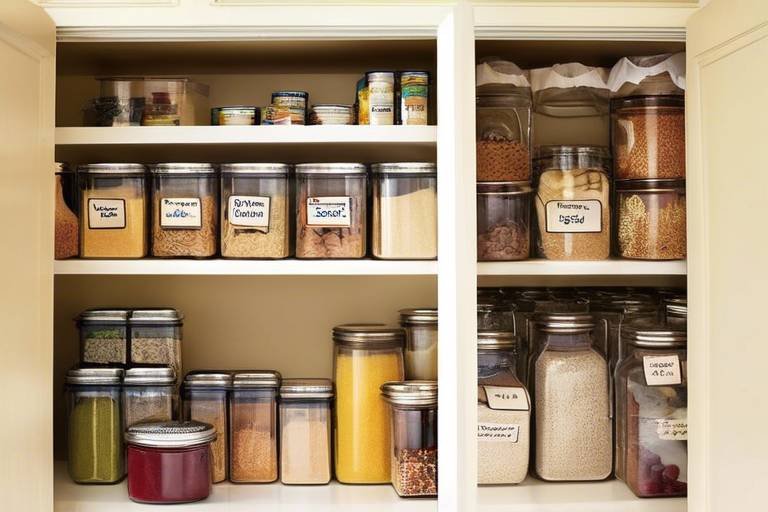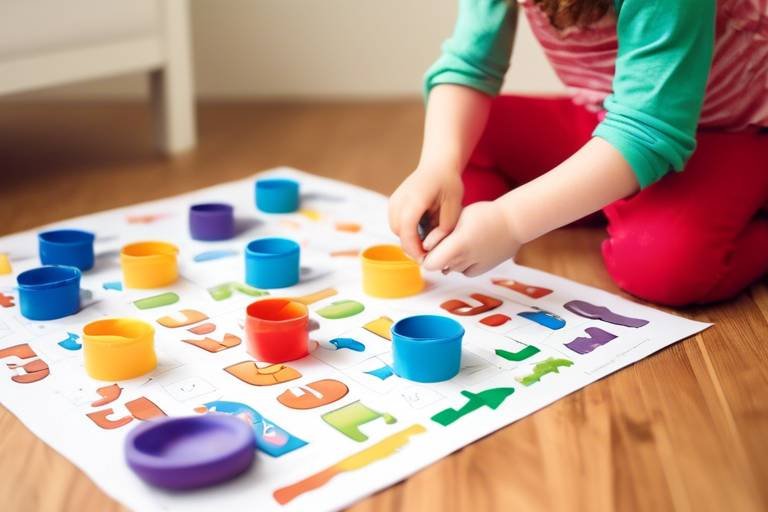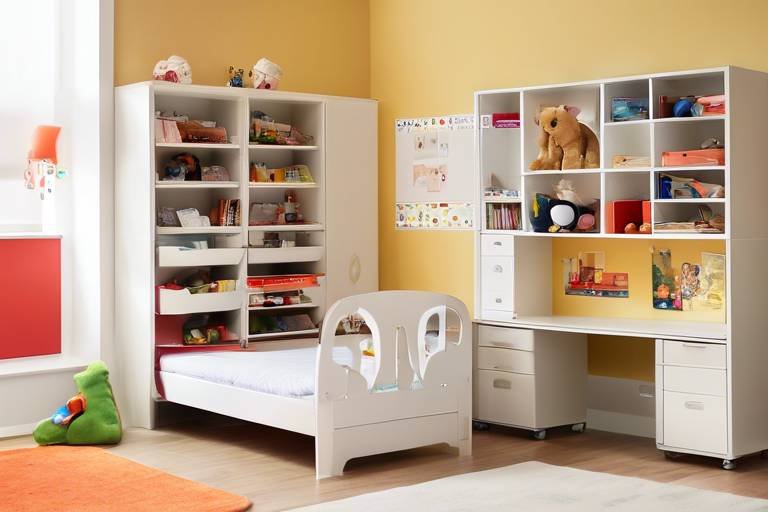The Importance of Home Maintenance in Family Life
In the hustle and bustle of daily life, it's easy to overlook the significance of regular home maintenance. However, it plays a pivotal role in creating a nurturing environment for families. Think of your home as a living organism; just like we need to eat well and exercise to stay healthy, our homes require consistent care to thrive. From ensuring safety to fostering a sense of responsibility and community, the benefits of home maintenance are profound and far-reaching.
Imagine coming home after a long day, only to be greeted by a cozy, well-maintained space that feels safe and inviting. This sense of comfort doesn't just happen; it’s the result of regular upkeep. When families prioritize home maintenance, they not only protect their investment but also enhance their quality of life. It’s about creating a sanctuary where memories are made, and relationships are strengthened. So, how do we cultivate this environment? Let’s dive deeper into the myriad ways home maintenance impacts family life.
One of the most compelling reasons to engage in regular home maintenance is the prevention of costly repairs. Picture this: a small leak in your roof goes unnoticed for months, leading to extensive water damage and a hefty repair bill. By staying proactive with maintenance, you can catch these issues early, saving both time and money. Regular checks and updates on appliances, plumbing, and electrical systems not only ensure everything is functioning correctly but also promote a sense of security within the household.
Moreover, home maintenance is not just about fixing things; it's about enhancing the overall living experience. A well-maintained home can improve air quality, reduce allergens, and create a healthier environment for your family. This is especially important for families with young children or elderly members who may be more vulnerable to health issues. By committing to regular maintenance, you are investing in the well-being of your loved ones.
In conclusion, home maintenance is an essential aspect of family life that should never be underestimated. It fosters safety, enhances well-being, and strengthens familial bonds. As we explore the various benefits and considerations of home maintenance, remember that every small effort counts. Your home is a reflection of your family, and with a little care, it can be a place of joy, safety, and togetherness.
- Why is regular home maintenance important? Regular maintenance helps to prevent costly repairs, enhances safety, and improves the overall quality of life for families.
- How can I involve my children in home maintenance? Involving kids in maintenance tasks teaches responsibility and can be turned into fun activities, like gardening or organizing their rooms.
- What are some essential maintenance tasks to prioritize? Regular checks of smoke detectors, plumbing, and outdoor lighting are crucial for safety and security.
- Can home maintenance improve family relationships? Yes! Engaging in maintenance tasks together can strengthen family bonds and create lasting memories.

Benefits of Regular Home Maintenance
When it comes to the heart of your family life, your home plays a pivotal role. Regular home maintenance is like a well-tuned engine; it keeps everything running smoothly and prevents unexpected breakdowns. Imagine waking up to a leaky roof or a malfunctioning heater in the dead of winter. Not only can these issues strain your finances, but they can also disrupt your family's peace of mind. By staying proactive, you can avoid these costly repairs and ensure a comfortable living environment for your loved ones.
One of the most significant benefits of regular home maintenance is the enhancement of safety within your household. Think about it—when you conduct routine checks on your home, you’re not just keeping things tidy; you’re actively identifying potential hazards that could lead to accidents. For instance, inspecting your electrical systems can prevent dangerous fires, while checking for loose railings can keep your children safe from falls. A well-maintained home is a fortress of safety, allowing your family to thrive without the looming worry of accidents.
Moreover, regular maintenance can significantly improve the overall quality of life for families. A clean, organized home fosters a sense of calm and well-being. You might not realize it, but clutter and disrepair can contribute to stress. When you take the time to maintain your home, you’re essentially creating a sanctuary where your family can relax and enjoy each other’s company. This nurturing environment encourages family bonding, as everyone feels more comfortable and at ease in a well-kept space.
In addition to enhancing safety and comfort, regular home maintenance can also lead to increased property value. Think of your home as an investment. Just like stocks, homes require care and attention to appreciate over time. By maintaining your property, you not only ensure that it remains a safe haven for your family but also protect and potentially increase its market value. This is particularly important if you ever decide to sell your home; prospective buyers are more likely to be attracted to a property that has been well-cared for.
Let’s not forget the financial aspect of home maintenance. While some may view it as an expense, it’s actually an investment in your family’s future. By addressing small issues before they escalate into major repairs, you can save a significant amount of money in the long run. For instance, a minor plumbing leak, if left unchecked, can lead to extensive water damage and costly repairs. By staying on top of maintenance tasks, you can keep your budget in check and allocate your hard-earned money to more enjoyable family experiences.
In conclusion, the benefits of regular home maintenance extend far beyond mere aesthetics. From enhancing safety and comfort to increasing property value and saving money, maintaining your home is a crucial aspect of family life. It’s not just about fixing things; it’s about creating a nurturing environment where your family can grow, thrive, and make lasting memories together.

Safety and Security Considerations
When it comes to our homes, safety and security are paramount. The home is not just a physical space; it’s where we create memories, share laughter, and find comfort. However, without regular maintenance, that comfort can quickly turn into chaos. Imagine walking through your living room and tripping over a loose rug or realizing that your smoke detector hasn’t worked for months. Scary, right? Regular maintenance ensures that these potential hazards are addressed before they become serious issues. By implementing simple yet effective safety checks, you can significantly enhance the security and safety of your family environment.
One of the most critical aspects of home maintenance is the identification and mitigation of hazards. Regular inspections can help pinpoint issues such as faulty wiring, leaky roofs, or even mold growth that could pose health risks. By being proactive, you not only protect your family but also save yourself from costly repairs down the line. Think of it like visiting the doctor for a check-up; it’s better to catch a problem early than to deal with the consequences later. In fact, a well-maintained home can be a fortress against accidents and intrusions.
To illustrate the importance of safety and security, let’s take a look at a few essential maintenance tasks that every homeowner should consider:
- Regularly Inspecting Smoke Detectors: Ensure that smoke detectors are functioning correctly by testing them monthly and replacing batteries at least once a year. This simple task can save lives.
- Checking Fire Extinguishers: Make sure that fire extinguishers are easily accessible and not expired. Familiarize your family with their locations and usage.
- Maintaining Outdoor Lighting: Well-lit entrances and pathways deter intruders and make your home safer for your family and guests.
These tasks may seem mundane, but they play a significant role in creating a secure living environment. Moreover, it’s not just about the physical aspects; it’s also about peace of mind. Knowing that your home is safe allows you to relax and enjoy your time with family.
Accidents can happen in the blink of an eye, and many of them are preventable with proper maintenance. For instance, keeping hallways and staircases clear of clutter can drastically reduce the risk of falls. Imagine a child racing down the stairs only to trip over a misplaced toy. By creating a clean and organized space, you're not just tidying up; you're actively safeguarding your family’s well-being.
Another critical area to focus on is childproofing your home. If you have young children, it’s essential to create a safe environment where they can explore without constant supervision. Simple measures like securing heavy furniture to the walls, using outlet covers, and installing safety gates can make a world of difference. It’s about turning your home into a sanctuary where kids can play freely and parents can breathe easy.
Childproofing is not just a one-time task; it’s an ongoing process that evolves as your child grows. Regularly reassess your home for new hazards as children reach different developmental milestones. For example, as toddlers become more mobile, they might start climbing on furniture or reaching for items on counters. Adapting your home to these changes is crucial. Consider creating a checklist for childproofing that you can revisit every few months to ensure your home remains a safe haven.
Fire safety is another critical component of home maintenance. It’s essential to conduct regular checks on smoke detectors, fire extinguishers, and your home's electrical systems. Did you know that most house fires start because of electrical issues? Regular inspections can help catch these problems before they escalate. Schedule a yearly fire safety audit, where you can review your fire escape plan, check the functionality of your smoke detectors, and ensure your fire extinguishers are up to date. This proactive approach can save lives.
In conclusion, safety and security considerations are vital elements of home maintenance that protect your family and enhance your quality of life. By taking the time to regularly inspect and maintain your home, you create a safe environment where your family can thrive.
Q: How often should I check my smoke detectors?
A: It’s recommended to test smoke detectors monthly and replace the batteries at least once a year.
Q: What are some quick childproofing tips?
A: Secure heavy furniture to the walls, use outlet covers, and install safety gates at stairways.
Q: How can I ensure my home is fire-safe?
A: Regularly check smoke detectors, maintain fire extinguishers, and conduct yearly electrical system inspections.

Preventing Accidents at Home
When it comes to keeping our family safe, the home should be a sanctuary, not a source of worry. It’s essential to recognize that many accidents can be prevented with a little attention to detail and regular maintenance. Think of your home as a living organism; just like we need check-ups to stay healthy, our homes require regular inspections to ensure they are safe for everyone. By identifying and addressing potential hazards, we can significantly reduce the risk of accidents and create a secure environment for our loved ones.
Start by conducting a thorough walk-through of your home. Look for common hazards that might be lurking around every corner. For instance, are there loose rugs that could lead to trips and falls? Are the staircases well-lit and equipped with sturdy handrails? These are simple yet effective checks that can make a world of difference. Furthermore, keeping pathways clear of clutter is crucial. Imagine a scenario where someone is rushing to grab a snack in the kitchen, only to trip over a stray shoe left in the hallway. It’s a small oversight, but it can lead to serious injuries.
Another area to focus on is the kitchen, which can be a hotbed for accidents. Cooking can ignite chaos if we’re not careful. Ensure that all kitchen tools are stored safely, out of reach of children. Additionally, consider installing child-proof locks on cabinets that contain hazardous materials like cleaning supplies or sharp objects. This simple action can prevent little hands from accessing dangerous items, making your kitchen a safer place for everyone.
Don’t forget about the bathroom either; it’s another area where slips and falls are common. A non-slip mat in the shower or bathtub can be a game-changer. Also, ensure that all electrical appliances are kept away from water sources to avoid electrocution risks. Regularly inspect your home for potential electrical hazards, such as frayed cords or overloaded outlets. Addressing these issues promptly can save you from a dangerous situation later on.
In addition to these preventive measures, it’s also wise to establish a routine for checking smoke detectors and carbon monoxide alarms. These devices are your first line of defense in case of an emergency. Did you know that approximately 50% of home fire deaths occur in homes without working smoke detectors? Make it a habit to test these alarms monthly and replace the batteries at least once a year. This small act can be the difference between life and death.
Lastly, consider creating a family plan for emergencies. Discuss with your family what steps to take in case of a fire, flood, or other emergencies. Having a plan in place not only prepares everyone but also instills a sense of security within the household. When everyone knows what to do, it can help minimize panic and chaos during a crisis.
In conclusion, preventing accidents at home is all about awareness and action. By regularly assessing your living space for potential hazards and making necessary adjustments, you can create a safer environment for your family. Remember, a little effort today can prevent a significant accident tomorrow. So, roll up your sleeves, gather the family, and make home safety a priority!
Q: What are some common household hazards I should look for?
A: Common hazards include loose rugs, cluttered walkways, slippery bathroom floors, and improperly stored cleaning supplies. Regularly checking these areas can help prevent accidents.
Q: How often should I check my smoke detectors?
A: It's recommended to test your smoke detectors monthly and replace the batteries at least once a year to ensure they are functioning properly.
Q: What should I do if I find a hazard in my home?
A: Address the hazard immediately. For example, secure loose rugs, clear clutter, or install safety devices like child-proof locks. If it’s a more serious issue, consider hiring a professional.

Childproofing Your Home
Childproofing your home is not just a precaution; it's a vital step in ensuring that your little ones can explore their environment safely. Imagine your home as a playground where every corner holds potential for fun, but also for danger. As parents, it's our responsibility to transform that playground into a safe haven. Start by assessing your home for hazards that could lead to accidents. For instance, sharp edges on furniture, accessible cords, and small objects that could be swallowed are all risks that can be easily mitigated.
One of the first steps in childproofing is to secure heavy furniture to the wall. This prevents tipping, which can lead to serious injuries. Additionally, consider installing safety gates at the top and bottom of stairs. Gates are not just barriers; they are your first line of defense against falls. Furthermore, outlets can be a source of curiosity for young children. Using outlet covers can effectively eliminate the risk of electrical shocks, giving you peace of mind while your child plays.
Another important aspect is to keep harmful substances out of reach. This includes cleaning supplies, medications, and anything that could be toxic. A great tip is to store these items in high cabinets or locked drawers. You can also use childproof locks on cabinets that are within reach of tiny hands. Remember, it’s not just about keeping them safe today; it’s about instilling habits that will protect them in the future.
When it comes to the kitchen, the stove can be a particularly hazardous area. Consider using stove knob covers to prevent little fingers from turning on burners. Additionally, always keep pot handles turned inward to minimize the risk of hot liquids spilling. In the bathroom, make sure to install non-slip mats and keep the toilet lid closed. A toilet lock can also be a great investment to prevent curious toddlers from exploring.
Lastly, don’t forget about outdoor safety. If you have a yard, ensure that fences are secure and that any tools or chemicals are stored away. A safe outdoor environment allows children to enjoy the fresh air while minimizing risks. Childproofing doesn’t have to be a daunting task; it can be an engaging project for the entire family. Involve your kids by explaining the importance of safety and let them help with simple tasks. This not only teaches them about safety but also empowers them to take responsibility for their environment.

Maintaining Fire Safety
Fire safety is not just a checklist; it’s a vital part of home maintenance that can mean the difference between life and death. Did you know that a majority of house fires can be prevented with simple, regular checks? By prioritizing fire safety, you’re not only protecting your property, but you’re also safeguarding your loved ones. This section will guide you through essential fire safety practices that are easy to implement yet incredibly effective.
First and foremost, regularly check your smoke detectors. These little devices are your first line of defense against fire hazards. It’s recommended to test them at least once a month. If they start beeping, it’s time to replace the batteries. Furthermore, smoke detectors have a lifespan of about 10 years, so if yours are older, consider replacing them entirely. A simple reminder on your calendar can help you stay on top of this crucial task.
In addition to smoke detectors, having a fire extinguisher readily available in key areas of your home is essential. Make sure to check the pressure gauge monthly and replace or recharge it if it’s low. It’s also important to familiarize yourself and your family with how to use it. You wouldn’t want to be scrambling for instructions in case of an emergency!
Another critical aspect of fire safety is maintaining your electrical systems. Faulty wiring is a leading cause of fires, so consider hiring a professional to inspect your home’s wiring every few years. Look out for signs like flickering lights or outlets that feel warm to the touch. These could be red flags indicating a deeper issue. Keeping an eye on your appliances and ensuring they are in good working order can also prevent electrical fires.
Lastly, it’s vital to establish a fire escape plan. Sit down with your family and discuss the best exits from your home in case of a fire. Practice this plan regularly, so everyone knows what to do when the alarm goes off. This not only prepares your family for an emergency but also fosters a sense of teamwork and responsibility.
To summarize, maintaining fire safety in your home is an ongoing commitment that involves:
- Regularly testing and replacing smoke detectors
- Keeping fire extinguishers accessible and in working condition
- Inspecting electrical systems for potential hazards
- Creating and practicing a fire escape plan
By incorporating these practices into your home maintenance routine, you’ll be taking significant steps to ensure your family’s safety. Remember, a proactive approach to fire safety is always better than a reactive one. So, take a moment today to assess your fire safety measures—you’ll be glad you did!

Enhancing Home Security
When it comes to the safety of our loved ones, enhancing home security is not just a task—it’s a necessity. In a world where uncertainties lurk around every corner, ensuring that your home is a fortress against potential threats can provide peace of mind and a sense of comfort. Think of your home as a cozy cocoon, where you and your family should feel completely safe and secure. So, how do we transform that cocoon into an impenetrable fortress? Let’s dive into some effective strategies that can make a significant difference.
One of the first steps in enhancing your home’s security is to upgrade your locks. Old or worn-out locks are like leaving the door wide open for intruders. Consider investing in high-quality deadbolts and smart locks that offer advanced features such as keyless entry and remote access. Imagine being able to lock or unlock your door from your smartphone while you’re at work! This not only boosts security but also adds convenience to your daily routine.
Next, let’s talk about installing security systems. Nowadays, you can find a plethora of options ranging from traditional alarm systems to state-of-the-art surveillance cameras. These systems act as both a deterrent and a means of monitoring your property. It’s like having a vigilant guardian watching over your home 24/7. Not to mention, many of these systems can send alerts directly to your phone, keeping you informed of any unusual activity.
Outdoor lighting is another crucial aspect of home security that often gets overlooked. A well-lit exterior can deter potential intruders who prefer to operate under the cover of darkness. Think of your home as a stage; the more lights you have shining on it, the less likely unwanted guests will want to step into the spotlight. Installing motion-activated lights around entry points and pathways can make a world of difference. They not only illuminate your surroundings but also give the impression that someone is always home, even when you’re not.
Lastly, it’s essential to maintain a secure environment by keeping your landscaping in check. Overgrown bushes and trees can provide hiding spots for intruders. Regularly trimming your hedges and keeping your yard tidy not only enhances your home’s curb appeal but also minimizes potential security risks. After all, a well-maintained yard sends a message that you care about your property, making it less appealing to those with ill intentions.
In conclusion, enhancing home security is an ongoing process that involves upgrading locks, installing security systems, improving outdoor lighting, and maintaining your landscaping. By taking these proactive steps, you can create a safer environment for your family, allowing everyone to feel secure in their own home. Remember, a little effort can go a long way in protecting what truly matters.
- What are the best types of locks for home security? High-quality deadbolts and smart locks are recommended for maximum security.
- How can I improve outdoor lighting for security? Install motion-activated lights around entry points and pathways to deter intruders.
- Are security systems worth the investment? Yes, they provide peace of mind and can deter potential threats significantly.
- What landscaping tips can enhance home security? Keep bushes and trees trimmed to eliminate hiding spots for intruders.

Building Family Bonds Through Maintenance
Engaging in home maintenance tasks as a family can be a transformative experience, weaving the fabric of relationships tighter and fostering a sense of unity among family members. Imagine the laughter echoing through the halls as everyone pitches in, each person contributing their unique strengths to create a safe and comfortable living space. Not only does this shared responsibility cultivate teamwork, but it also instills essential life skills that will serve your children well into adulthood. So, how do we turn these mundane chores into cherished bonding experiences?
First and foremost, it's about involvement. When everyone has a role to play, from the youngest to the oldest, it can change the dynamics of the task at hand. For instance, you could designate specific jobs that are age-appropriate. Young children can help with simple tasks like sorting tools or cleaning up, while older kids can tackle more complex jobs like painting a room or organizing the garage. This not only teaches them responsibility but also gives them a sense of ownership over their home. It’s like a mini project that everyone can rally around!
Moreover, creating family traditions around maintenance can turn routine tasks into something special. Perhaps you establish a monthly “Home Care Day” where everyone dedicates a few hours to tackle different projects around the house. You could even spice it up by adding a fun theme, like “Garden Day” or “Fix-It Day.” Afterward, reward yourselves with a family movie night or a homemade pizza party. This way, the work becomes a prelude to fun and relaxation, making it something everyone looks forward to.
Additionally, you might consider making it a competition! Set friendly challenges among family members, such as who can clean their room the fastest or who can organize the pantry most efficiently. This not only adds an element of fun but also encourages creativity and innovation in how tasks are approached. Just remember to celebrate everyone’s efforts, whether they win or lose. It’s all about building a supportive environment where everyone feels valued.
Finally, don’t underestimate the power of storytelling during these maintenance sessions. Share stories about how you learned to fix things or funny mishaps that happened during past projects. This not only makes the experience enjoyable but also strengthens emotional bonds as family members relate to one another’s experiences. By transforming maintenance into a shared journey, you’re not just maintaining your home; you’re nurturing your family.
- Why is family involvement in home maintenance important? Family involvement fosters teamwork, teaches responsibility, and strengthens relationships.
- How can we make home maintenance fun for kids? Turn tasks into games or friendly competitions, and reward them with fun activities afterward.
- What are some age-appropriate tasks for children? Young kids can help with sorting and cleaning, while older kids can take on painting or organizing duties.
- How often should we have family maintenance days? Monthly maintenance days can create a routine that everyone looks forward to.

Involving Children in Maintenance Tasks
Getting your children involved in home maintenance tasks is not just about keeping the house in shape; it's about building life skills and creating a sense of responsibility. Imagine transforming mundane chores into fun activities that not only teach your kids how to care for their environment but also strengthen family bonds. Have you ever thought about how a simple task like gardening can turn into a memorable family day? By involving children in these activities, you’re not just delegating chores; you’re opening the door to a world of learning and teamwork.
Children are naturally curious and eager to learn, so why not channel that energy into home maintenance? For instance, you could turn cleaning the garage into a treasure hunt. As they sift through old boxes, they might discover forgotten toys or interesting items, making the task feel like an adventure. This approach not only keeps them engaged but also teaches them the importance of organization and cleanliness. Think of it as a mini expedition where the reward is a tidy space and a sense of accomplishment.
Moreover, assigning age-appropriate tasks can instill a sense of pride in children. Younger kids can help with simple chores like dusting or sorting laundry, while older children can take on more complex tasks such as minor repairs or yard work. Here’s a quick breakdown of tasks suitable for different age groups:
| Age Group | Suggested Tasks |
|---|---|
| 3-5 years | Dusting surfaces, sorting toys, watering plants |
| 6-10 years | Organizing their rooms, helping with laundry, basic gardening |
| 11-15 years | Cleaning bathrooms, helping with meal prep, basic home repairs |
Another fantastic way to involve children is to create a family maintenance calendar. This calendar can include monthly tasks, seasonal chores, and even special projects like painting a room or planting a garden. By having a visual reminder, everyone can see what needs to be done and when, making it easier to plan family days around these tasks. Plus, checking off completed tasks can be incredibly satisfying—like leveling up in a video game!
Ultimately, involving children in maintenance tasks is about more than just keeping the house in order. It’s about fostering a sense of community within your family and teaching valuable lessons that will last a lifetime. So, the next time you’re tackling a home project, consider inviting your kids to join in. You might just find that these moments become cherished memories that your family will look back on fondly.
Q: How can I make maintenance tasks more fun for my children?
A: Incorporate games or challenges, like a race to see who can clean their room the fastest or a scavenger hunt while organizing the garage.
Q: At what age should I start involving my children in home maintenance?
A: You can start as young as three years old with simple tasks and gradually increase the complexity as they grow older.
Q: What are some benefits of involving children in maintenance tasks?
A: It teaches responsibility, enhances their problem-solving skills, and strengthens family bonds through teamwork.

Creating Family Traditions Around Maintenance
Establishing regular maintenance rituals can transform mundane chores into cherished family traditions. Think about it: when you engage in home upkeep together, you’re not just fixing things; you’re building memories! Imagine a Saturday morning where everyone pitches in, laughter fills the air, and the aroma of freshly baked cookies wafts from the kitchen. By turning maintenance into a family affair, you can create a sense of unity and shared responsibility that lasts a lifetime.
One way to start is by designating a specific day each month for family maintenance activities. This could be a day when you tackle various tasks around the house, such as cleaning out the garage, organizing the attic, or even doing seasonal yard work. You can make it a fun event by adding a breakfast or lunch together afterward to celebrate your hard work. This not only helps keep your home in tip-top shape but also reinforces the idea that maintaining your living space is a collective effort.
Moreover, you can incorporate fun elements into these maintenance days. For instance, turn cleaning into a friendly competition. Create teams and see who can clean their assigned area the quickest or make it a scavenger hunt where family members search for items to donate or throw away. By adding these playful twists, you can keep everyone engaged and excited about the tasks at hand.
Another fantastic idea is to document your family maintenance traditions. You could keep a scrapbook or a digital photo album that captures your family's efforts over the years. Each time you complete a project, take a picture and write a little note about what you did and how it felt. This not only preserves the memories but can also serve as a fun reminder of how far you’ve come as a family. You might even find that these traditions evolve as your family grows and changes, creating a rich tapestry of shared experiences.
In conclusion, creating family traditions around maintenance is not just about keeping your home in good shape; it's about fostering a sense of community, pride, and togetherness. By embracing these rituals, you can turn maintenance into meaningful moments that strengthen your family bonds. So why not gather your loved ones, pick a weekend, and start a tradition that will be cherished for generations to come?
- What are some fun maintenance activities for families? Activities like gardening, cleaning projects, or DIY home improvements can be enjoyable when done together.
- How can I involve my kids in home maintenance? Assign age-appropriate tasks, like organizing toys or simple cleaning, and make it a game to keep them engaged.
- Why are family maintenance traditions important? They help teach responsibility, promote teamwork, and create lasting memories.
Frequently Asked Questions
- Why is regular home maintenance important for families?
Regular home maintenance is crucial as it helps prevent costly repairs, enhances safety, and improves the overall quality of life. By staying proactive, families can ensure their home remains a secure and comfortable environment.
- What are some simple maintenance tasks to prevent accidents at home?
Some simple tasks include checking for loose railings, securing rugs to prevent slips, and ensuring that electrical outlets are childproofed. Regularly inspecting these areas can significantly reduce the risk of accidents.
- How can I childproof my home effectively?
To childproof your home, start by covering sharp edges, securing heavy furniture to walls, and using safety gates. Additionally, keep hazardous materials out of reach and install cabinet locks to enhance safety for your little ones.
- What fire safety measures should I take?
Regularly check smoke detectors, replace batteries, and ensure fire extinguishers are accessible and functional. Also, inspect electrical systems and avoid overloading outlets to minimize fire hazards.
- How can I enhance my home’s security?
Enhancing home security can be achieved by upgrading locks, installing security systems, and maintaining outdoor lighting. These measures not only protect your family but also provide peace of mind.
- What are some ways to involve children in home maintenance?
Involving children can be fun! Assign them simple tasks like watering plants, organizing their rooms, or helping with yard work. This not only teaches responsibility but also instills a sense of pride in their living space.
- Can home maintenance become a family bonding experience?
Absolutely! Turning maintenance tasks into family activities can strengthen bonds. Create traditions around seasonal maintenance, like spring cleaning or holiday preparations, to promote teamwork and create lasting memories.



















